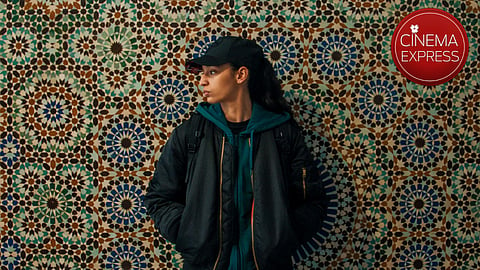

Cannes Film Festival can often turn out to be an auspicious journey to belongingness for filmmakers. Like it has been for the French actor-filmmaker Hafsia Harzi of Tunisian-Algerian descent. She started off in 2019 at the parallel Critic’s Week segment with her debut feature film You Deserve A Lover. Her sophomore film Good Mother played in the official Un Certain Regard section in 2021 and bagged an ensemble award. This year she comes full circle with her France-Germany co-production La Petite Dernière (The Little Sister) having premiered in the festival’s main competition section.
Based on Fatima Daas’s auto fictional novel, The Last One, the film tries to seamlessly bring together two often seen narrative threads in cinema—that of immigrant reality and queer identity issues. However, the former remains more of a backdrop and context to help take a deep dive into the latter.
In keeping with its title, the film is centered on the teenaged Fatima (Nadia Melliti), the youngest of the three daughters of Algerian immigrants in Paris. Happy in the folds of a warm and caring family, enjoying her time with friends and devout in her faith, she nonetheless finds herself slowly getting torn apart as she grapples with her identity and desires—her growing attraction and affection for women.
It's a coming-of-age film about coming out, not so much to the world as to yourself. We see Fatima well-adjusted with her friends and fellow students, deep into reading as well as sports, defined by her tomboy getup, sporty gear and the baseball cap. There’s also a mysterious, shadowy, seemingly loving but deeply orthodox and patriarchal beau, pointing out her unfeminine ways yet claiming to love her despite how she chooses to be.
Slowly as she takes to dating apps and begins exploring the covert queer culture of the city, she also finds a soulmate in Ji-Na (Park Ji-min). Simultaneously, she also seeks counsel from a cleric, ostensibly for a friend, which leaves her more conflicted than at peace.
Unlike a lot of queer films about battling the prejudiced world out there, The Little Sister is not high on conflict and drama. It’s an ordinary slice of life film and an introspective character study where the only villain seems to be the asthma that afflicts Fatima and Ji-Na’s own inner demons which threaten to derail their relationship. In fact, early on, it’s Fatima who makes fun of her gay friend and gets uncontrollably enraged when called a lesbian. A sign of her own defensiveness.
Save for such odd moments of outbursts, Harzi keeps things understated and simple. There’s an assured quietude about her storytelling. The Little Sister is not radical or rebellious in its spirit. It’s not so much about confrontations as conciliation. The eventual assertion is that relationships, religion and identity can co-exist happily. Fatima can be a great daughter and a good Muslim while living a fulsome queer life.
There’s a humane, empathetic and compassionate core to The Little Sister that makes it tough not to like and appreciate it, even though it may take a predictable route and not quite blow you away.
Nadia Melliti, who plays the lead, is a non-professional actor and Harzi uses her tentativeness deftly to bring out the essential hesitancy and confusion in Fatima. Park Ji-min, who made a mark in Cannes in 2023 with the stunning Return To Seoul is wonderfully layered in bringing out the complexities of Ji-Na.
Cinematographer Jeremie Attard frames them in evocative, telling closeups, even as he gives us a panoramic, sweeping peep into the queer spaces, bars, clubs and subculture. Amine Bouhafa’s music lends it a pulsating, vibrant touch and Geraldine Mangenot’s editing shifts dexterously between the inner and outer worlds of Fatima.
The most moving moments are all about Fatima’s interactions with her mother (Amina Ben Mohamed), her silent tears finding warmth and love in the mother’s kind whispers. You know that like all mothers, she knows what her child is going through and will be there for her no matter what.
In that sense The Little Sister took me back to Rohan Kanawade’s Sabar Bonda (Cactus Pears), the Marathi language winner at the Sundance Film Festival. Both the films underscore the fact that a lot of the goodness in our lives can be traced back to the power of positive parenting. It’s what makes both the films so affecting, heartwarming and affirming. Something we need more of, not just at the movies, but in life as well.